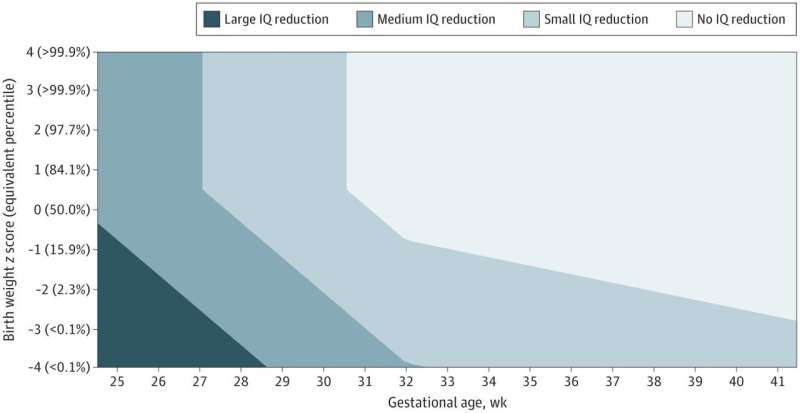This article has been reviewed according to Science X's editorial process and policies. Editors have highlighted the following attributes while ensuring the content's credibility:
fact-checked
peer-reviewed publication
trusted source
proofread
New research explores the link between baby birthweight, length of pregnancy and future cognitive problems

A new study has explored the link between infant birthweight, gestational age and future cognitive problems.
Publishing in JAMA Network Open, scientists have shown how the relative birthweight of infants associates with cognitive performance at five years of age. The results broadly indicate that a large birthweight is good for IQ, but this is relative to gestational age (the week of pregnancy the baby is born—for a healthy nine-month pregnancy this is 40 weeks).
Previous studies had shown that a combination of how heavy a baby is at birth and how early it is born relates to later cognitive abilities, but this study investigates whether the relative birthweight (being born at a lower birthweight relative to how many weeks long a pregnancy is), might also be important for later cognitive performance.
Infants whose birthweight is very low compared with those born at the same gestational age appear more likely to experience developmental problems later at five years of age.
The study, led by Bielefeld University and the University of Warwick, combined data from around the world, based on four large international infant cohorts of over 30,000 children.
Lead Author Robert Eves, who is co-affiliated with Bielefeld University and the University of Warwick, said, "When a baby is born their birthweight percentile is often calculated, which is their birthweight relative to their gestational age. Traditionally, researchers have used above or below the 10th percentile as a potential risk factor for long-term developmental issues."
If a baby is in the 10th percentile for weight, 10% percent of babies of the same age and gender weigh less and 90% percent weigh more.
Eves added, "We wanted to investigate whether the focus on above or below the 10th percentile is justified or whether there is a more gradual association between relative birthweight and cognitive development. In addition, we wanted to see if there were problems associated with having a very large birthweight percentile.
"We find no evidence that there is anything particularly unique about the 10th percentile. We find that increasing birthweight percentiles are associated with increased cognitive scores, from the first percentile until the 69th percentile. However, from this point, there is a plateau so there were no significant cognitive differences between infants born at the 69th, 79th, or 89th percentile for example."
The results suggest that the commonly used above/below the 10th percentile oversimplifies the association between relative birth weight and later cognitive performance.
Eves added, "Current National Institute for Health and Care Excellence (NICE) guidelines indicates enhanced developmental support and surveillance should be provided for all infants born before 30 weeks. This could be further enhanced by additionally considering their relative birthweight."
"For example, we find the estimated cognitive performance of an infant born at 30 weeks gestation and at the 69th birthweight percentile to be similar to that of an infant born at 35 weeks gestation and the 2nd birthweight percentile. Thus, a more nuanced approach may be beneficial."
"It's also important to note that while relative birthweight and gestational age may influence childhood development, they are two of potentially many other factors, such as the parent-child relationship, that also help to shape the development of the child."
Professor Dieter Wolke, Department of Psychology, University of Warwick, added, "Obstetricians have to balance decisions due to potential complications for fetus or mother against potential trade-offs of early delivery on child cognitive outcome."
"Our results help in the decision process as the analysis considers both gestation and birth weight. It shows that risk for cognitive sequelae is highest when gestation and birthweight are low but suggests that if the anticipated birthweight is high being born a week or three earlier may have little adverse impact on cognitive outcome by five years."
More information: Robert Eves et al, Association of Birth Weight Centiles and Gestational Age With Cognitive Performance at Age 5 Years, JAMA Network Open (2023). DOI: 10.1001/jamanetworkopen.2023.31815 , jamanetwork.com/journals/jaman … /fullarticle/2808936





















